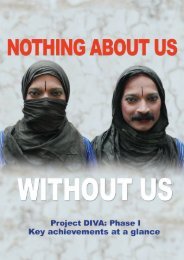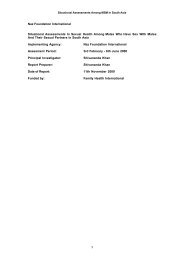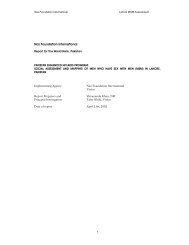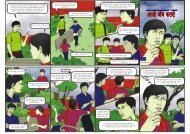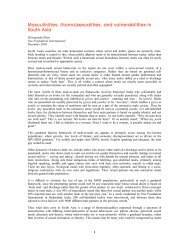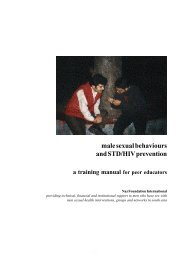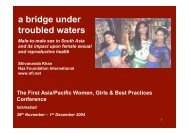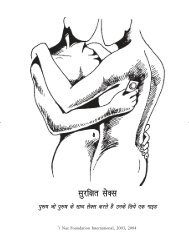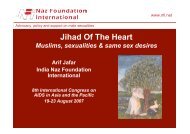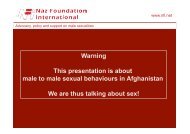Scaling up HIV programming for men who have sex ... - apcom.org
Scaling up HIV programming for men who have sex ... - apcom.org
Scaling up HIV programming for men who have sex ... - apcom.org
You also want an ePaper? Increase the reach of your titles
YUMPU automatically turns print PDFs into web optimized ePapers that Google loves.
wo<strong>men</strong>’s programmes that may encompass transgender male to female<br />
services, poverty alleviation, and so <strong>for</strong>th). Understanding a donor’s funding<br />
strategy, including past and recent fund recipients, will save both you and the<br />
donor time and money.<br />
2. Plan necessary accommodations and travel far in advance, including that<br />
which may be needed by secretariat staff and planning committee<br />
members <strong>for</strong> meetings. Often, a donor will approve grant funds to be used <strong>for</strong><br />
travel <strong>for</strong> programme and manage<strong>men</strong>t staff, as happened extensively with US<br />
govern<strong>men</strong>t-funded INGO <strong>for</strong> both the GMS meetings and the RR<br />
consultation. Other sources <strong>for</strong> internationally-sponsored travel <strong>for</strong> CSO are<br />
also available, such as from UN system agencies.<br />
3. Particularly <strong>for</strong> community-led processes, cash flow may quickly become<br />
an obstacle, as venue costs, salaries and printing are all costs which<br />
require immediate and advance pay<strong>men</strong>t. Try to negotiate with funders so<br />
that these costs can be paid directly or advanced to the fiscal agent. There are<br />
advantages to using an INGO as a single payer source, such as happened in the<br />
Greater Mekong, but you must also meet often stringent international<br />
accounting procedures that may not be cost effective or <strong>have</strong> the flexibility<br />
that might be needed <strong>for</strong> last minute changes.<br />
4. Consider asking donors to coordinate their s<strong>up</strong>port <strong>for</strong> both the process<br />
and the greater issue of funding scale <strong>up</strong> of MSM interventions in the<br />
region. This is a need even now in the Greater Mekong and Asia Pacific,<br />
which would greatly help both CSO and donors alike. The UN agency, ILO, is<br />
well-equipped, experienced and may well carry the mandate to help in such<br />
coordination.<br />
Conclusion: joining together works<br />
The Greater Mekong Sub-regional coordination and the pre-RR and post-RR Asia<br />
Pacific processes had one very significant impact – both brought the attention of many<br />
national govern<strong>men</strong>ts to the issue of <strong>HIV</strong> epidemics among MSM and the need to<br />
address them directly. This resulted in positive changes in national AIDS plans and<br />
strategic planning to reduce the incidence of <strong>HIV</strong> and increase services <strong>for</strong> MSM.<br />
Having govern<strong>men</strong>t representatives sit down and talk with civil society leaders and<br />
activists, together with collaborative partners from the donor and develop<strong>men</strong>t sector<br />
and with s<strong>up</strong>port from UNAIDS and sponsoring UN agencies, produced this success.<br />
Govern<strong>men</strong>ts as a <strong>who</strong>le will listen more when approached by a large number of<br />
many different constituents, such as those assembled <strong>for</strong> all of the consultations<br />
<strong>men</strong>tioned in this paper. There is advantage, too, of bringing govern<strong>men</strong>t officials out<br />
of their offices and out of their home country; it gives them latitude to both listen and<br />
actively participate in problem solving well beyond what may be otherwise possible.<br />
There may be times when communities must be vocal and visible advocates <strong>for</strong> their<br />
constituencies. But throughout the scale <strong>up</strong> processes in Asia and the Pacific the<br />
single most important idea to emerge was very simple: working together results in<br />
reduction of <strong>HIV</strong>. As learned in the GMS when it was stated so eloquently by one<br />
donor representative, and adopted and quoted during the RR consultation – we must<br />
maintain the focus on the epidemiology of <strong>HIV</strong>, the growing body of evidence of <strong>HIV</strong><br />
epidemics among MSM, and on the fact that it is high risk behaviours, unwittingly<br />
<strong>Scaling</strong> <strong>up</strong> <strong>HIV</strong> <strong>programming</strong> <strong>for</strong> <strong>men</strong> <strong>who</strong> <strong>have</strong> <strong>sex</strong> with <strong>men</strong> - the experience in Asia and the Pacific<br />
Page 21 of 23





